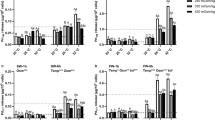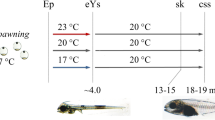Abstract
DAILY variations in circulating levels of the pituitary hormone prolactin have been reported in several vertebrates, including fishes1–4. In some animals, the 24-h rhythm changes seasonally with respect to the time of day that maximum and minimum prolactin levels occur4,5. It has been hypothesised that this seasonal change in phase of prolactin rhythm is an important component of the mechanism controlling seasonality in vertebrates6. Because water temperature is generally considered the principal environmental regulator of seasonal changes in reproduction and metabolism in many fishes, including the gulf killifish Fundulus grandis7, we determined the daily rhythm of serum prolactin concentrations in fish held at temperatures that are stimulatory (20 °C) or inhibitory (28 °C) for reproductive development. We found that an increase in water temperature from 20° to 28 °C phase shifts the daily variation of serum prolactin with respect to the daily photoperiod in F. grandis.
This is a preview of subscription content, access via your institution
Access options
Subscribe to this journal
Receive 51 print issues and online access
$199.00 per year
only $3.90 per issue
Buy this article
- Purchase on Springer Link
- Instant access to full article PDF
Prices may be subject to local taxes which are calculated during checkout
Similar content being viewed by others
References
McKeown, B. A. & Van Overbeeke, A. P. J. Fish. Res. Bd Can. 29, 303–309 (1972).
Leatherland, J. F. & McKeown, B. A. J. Interdisciplinary Cycle Res. 4, 137–143 (1973).
McKeown, B. A. & Peter, R. E. Can. J. Zool. 54, 1960–1968 (1976).
Spieler, R. E., Meier, A. H. & Loesch, H. C. Gen. comp. Endocr. 29, 156–160 (1976).
Meier, A. H. Am. Sci. 61, 184–187 (1973).
Meier, A. H. Hormonal Correlates of Behavior (eds Elefthenou, B. E. & Sprott, R. L.) 469–549 (Plenum, New York, 1975).
Fivizzani, A. J. dissertation, Louisiana State Univ. (1977).
deVlaming, V. L. Control of Sex in Fishes (ed. Schreck, C. B.) 13–83 (Sea Grant Extension Division, Virginia Polytechnic Institute and State University, Blacksburg, 1974).
Garcia, L. E. & Meier, A. H. Biol. Bull. Lancaster 144, 471–479 (1973).
Day, J. W., Jr, Smith, W. G., Wagner, P. R. & Stowe, W. C. Community Structure and Carbon Budget of a Salt Marsh and Shallow Bay Estaurine System in Louisiana 1–79 (Center for Wetland Resources, Baton Rouge, Louisiana, 1973).
Baggerman, B. Gen. comp. Endocr. Suppl. 3, 466–476 (1972).
Spieler, R. E. & Meier, A. H. J. Fish. Res. Bd Can. 33, 183–186 (1976).
Author information
Authors and Affiliations
Rights and permissions
About this article
Cite this article
SPIELER, R., NOESKE, T. & MEIER, A. Temperature-induced phase shift of daily rhythm of serum prolactin in gulf killifish. Nature 271, 469–470 (1978). https://doi.org/10.1038/271469a0
Received:
Accepted:
Issue Date:
DOI: https://doi.org/10.1038/271469a0
Comments
By submitting a comment you agree to abide by our Terms and Community Guidelines. If you find something abusive or that does not comply with our terms or guidelines please flag it as inappropriate.



